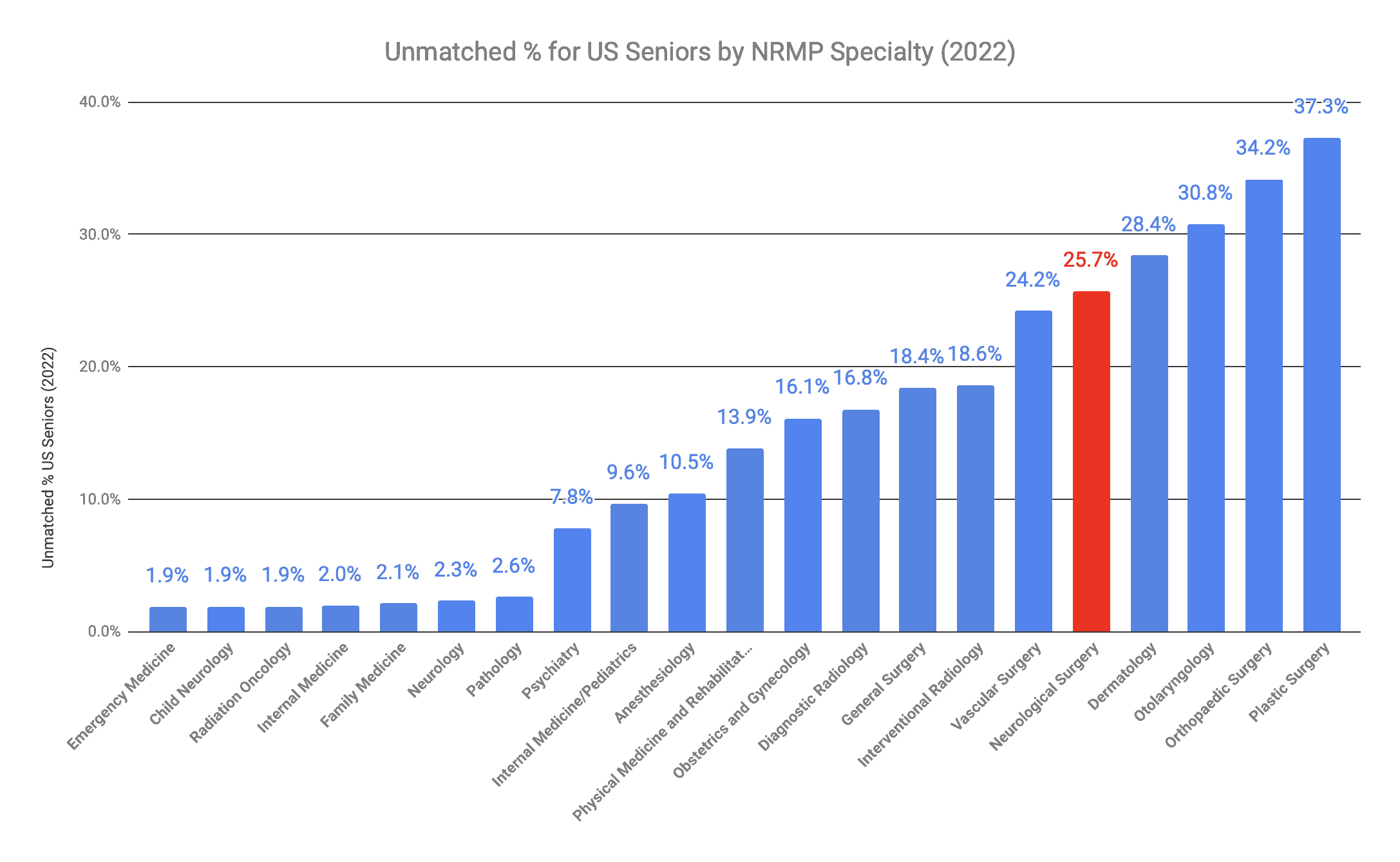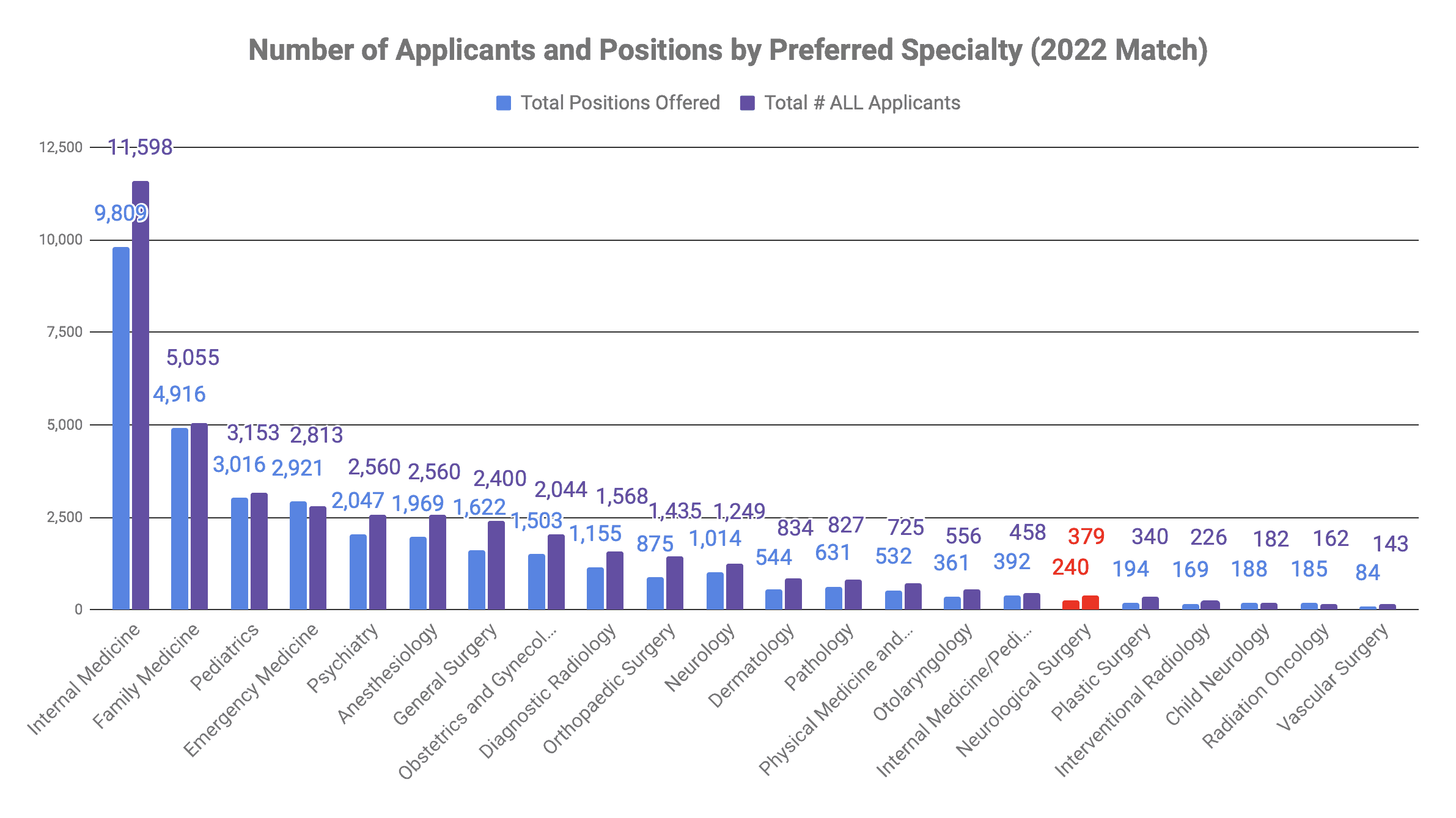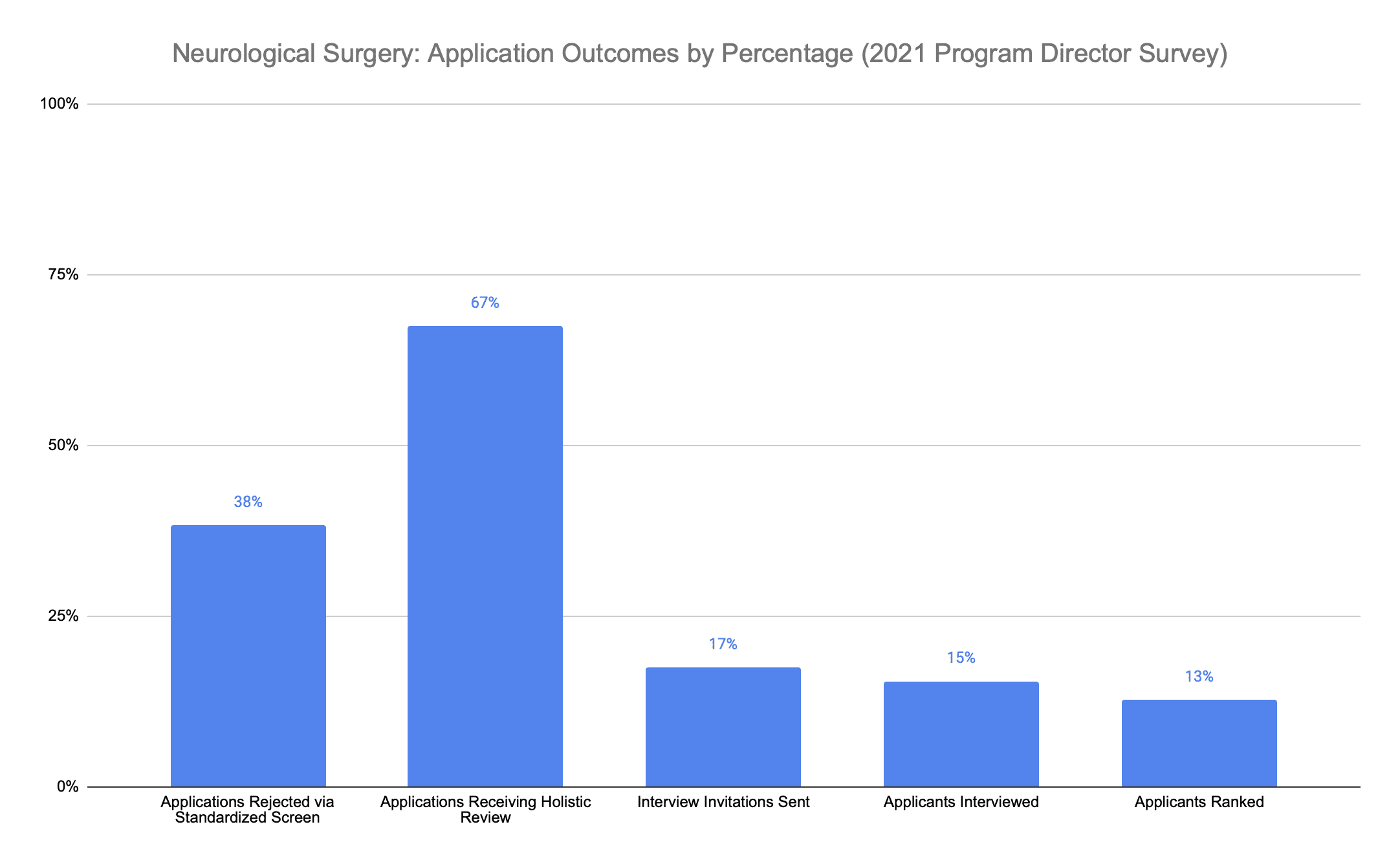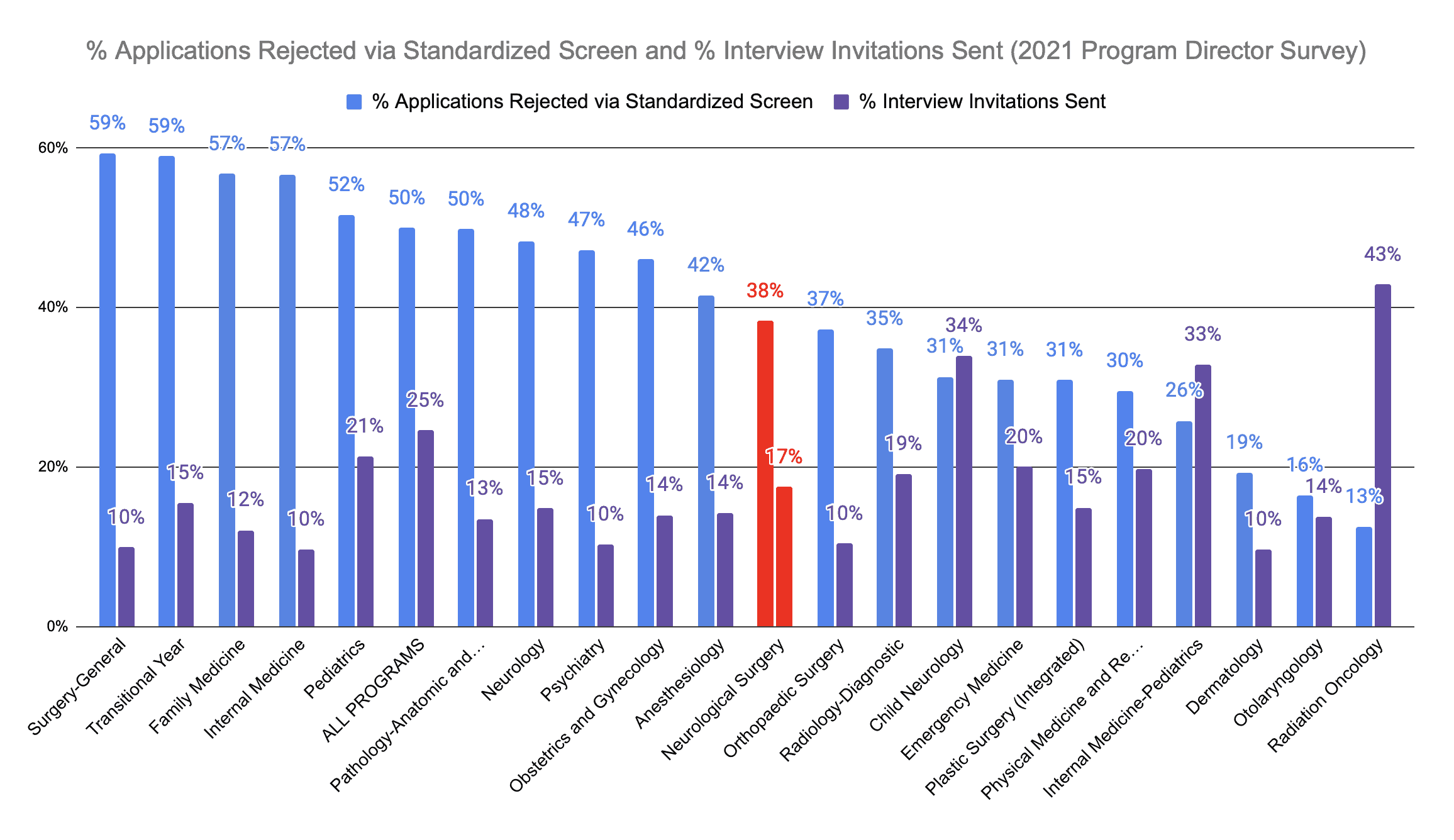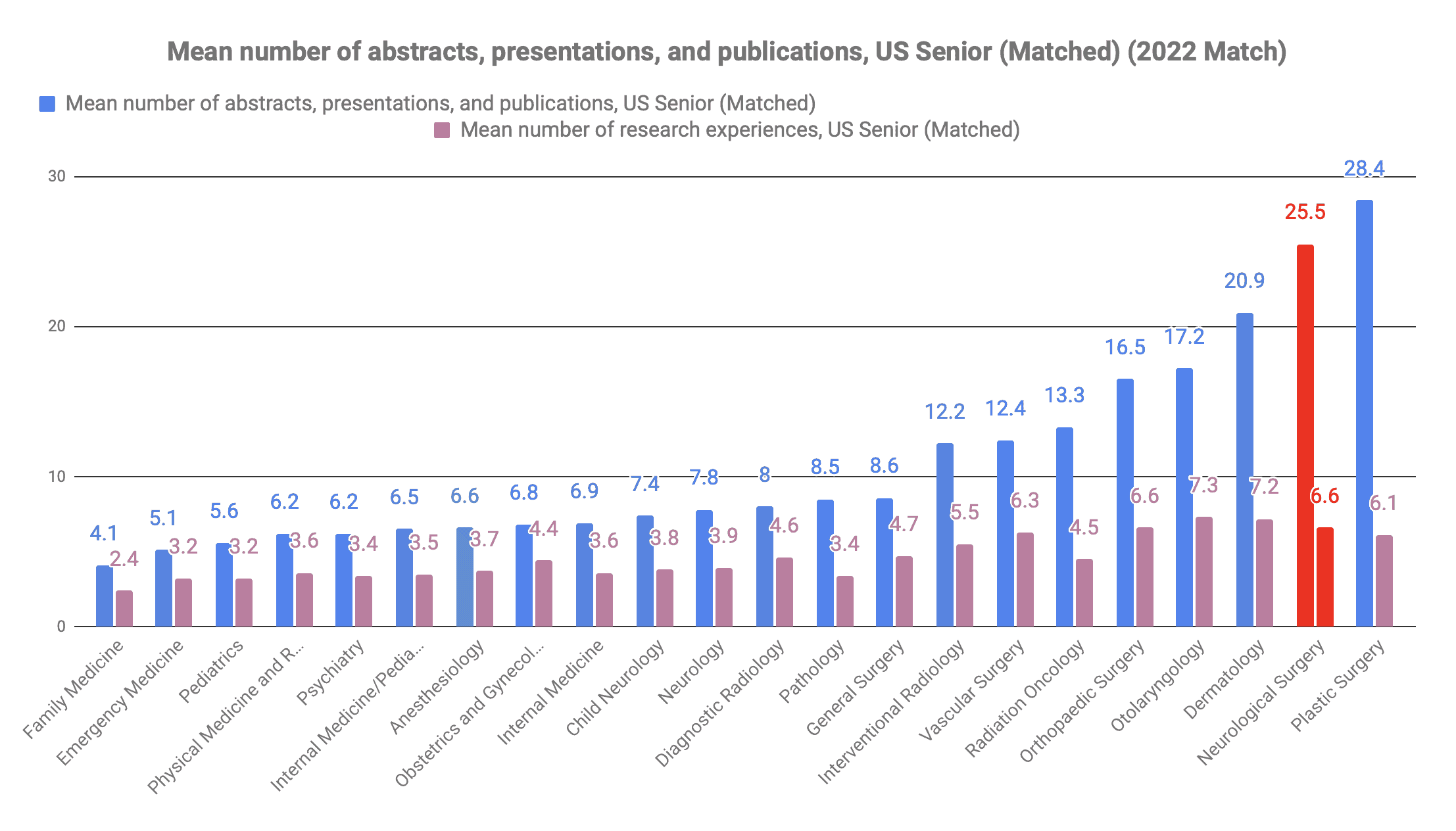
Is neurological surgery competitive? How important are the USMLEs, research, med school reputation, and AOA membership for matching into neurological surgery? Is neurological surgery IMG-friendly? And what is the DO match rate for neurological surgery programs?
In this article, you’ll learn everything about neurological surgery’s competitiveness in 2022. In the process, you’ll learn what to focus on – and what not to – to maximize your chances of matching into this desirable specialty.
Summary:
- Neurological Surgery Overall Competitiveness: High
- Research Importance: High
- USMLE Importance: High
- Importance of Attending Top 40 Med School: High
- Importance of Class Rank / Obtaining AOA (Med School Honors): High
Table of Contents
Is Neurological Surgery Competitive in 2022?
One way to assess the competitiveness of a specialty is to look at the match rate – the % of people who apply who end up matching into their preferred specialty.
Among US Seniors, the unmatched percentage was 25.7%, making it moderately competitive among US residencies. The match rate for neurological surgery is considerably better than the most competitive specialties like plastic surgery, orthopedic surgery, or otolaryngology. However, neurological surgery is considerably more competitive than pediatrics, emergency medicine, child neurology, or even general surgery in the 2022 match.
For more on the most competitive US specialties, see this article.
Neurological Surgery Match Rate
What is the Neurological Surgery match rate for US seniors, DO seniors, and IMGs? The “match rate” is the % of people who applied to a particular specialty as their preferred specialty who successfully matched into the specialty.
- US Senior Neurological Surgery Match Rate (2022 Match): 74.3%
- DO Senior Neurological Surgery Match Rate (2022 Match): 43%
- US IMG Neurological Surgery Match Rate (2022 Match): 22%
- Non-US IMG Neurological Surgery Match Rate (2022 Match): 38%
See below for more on matching into Neurological Surgery as a DO or IMG.
Neurological Surgery Match Statistics 2022
In 2022, there were 240 neurological surgery positions available in the NRMP match. A total of 379 applicants listed it as their preferred specialty.
In the 2022 Match, neurological surgery ranked #17 out of 22 specialties for most total positions offered, behind:
- Internal medicine: 9,809 positions
- Family medicine: 4,926 positions
- Emergency medicine: 2,921 positions
- General Surgery: 1,622 positions
- Neurology: 1,014 positions
- Pathology: 631 positions
How Many Applicants Receive Interviews in Neurological Surgery?
According to the 2021 Program Director survey, each Neurological Surgery program received 298 applications on average. Other data include:
- Applications received (Neurological Surgery): 298
- Applications rejected based on standardized screen (Neurological Surgery): 114
- Applications receiving holistic review (Neurological Surgery): 201
- Interview invitations sent (Neurological Surgery): 52
- Applicants interviewed (Neurological Surgery): 46
- Applicants ranked (Neurological Surgery): 38
Looking at the percentages, we can see that for the 2021 Match:
- 38% of neurological surgery applications were rejected via standardized screen,
- Only 67% of neurological surgery applications received a holistic review,
- 17% of neurological surgery applications received an interview invitation, and
- 13% of all neurological surgery applicants were ranked to match
Neurological Surgery is Moderately Reliant on Screens
Neurological Surgery relies on standardized screens to weed out applicants. In the 2021 Program Director Survey, neurological surgery PDs respondents reported that 38% of applications were rejected via standardized screen. This ranked near the middle of all residencies.
USMLE Scores for Neurological Surgery
Step 1 scores for neurological surgery for matched US seniors reflect its moderate competitiveness.
Neurological Surgery Step 1 Scores (Matched Applicants in 2022 Match):
- 25%ile: 256
- Median: 249
- 75%ile: 241
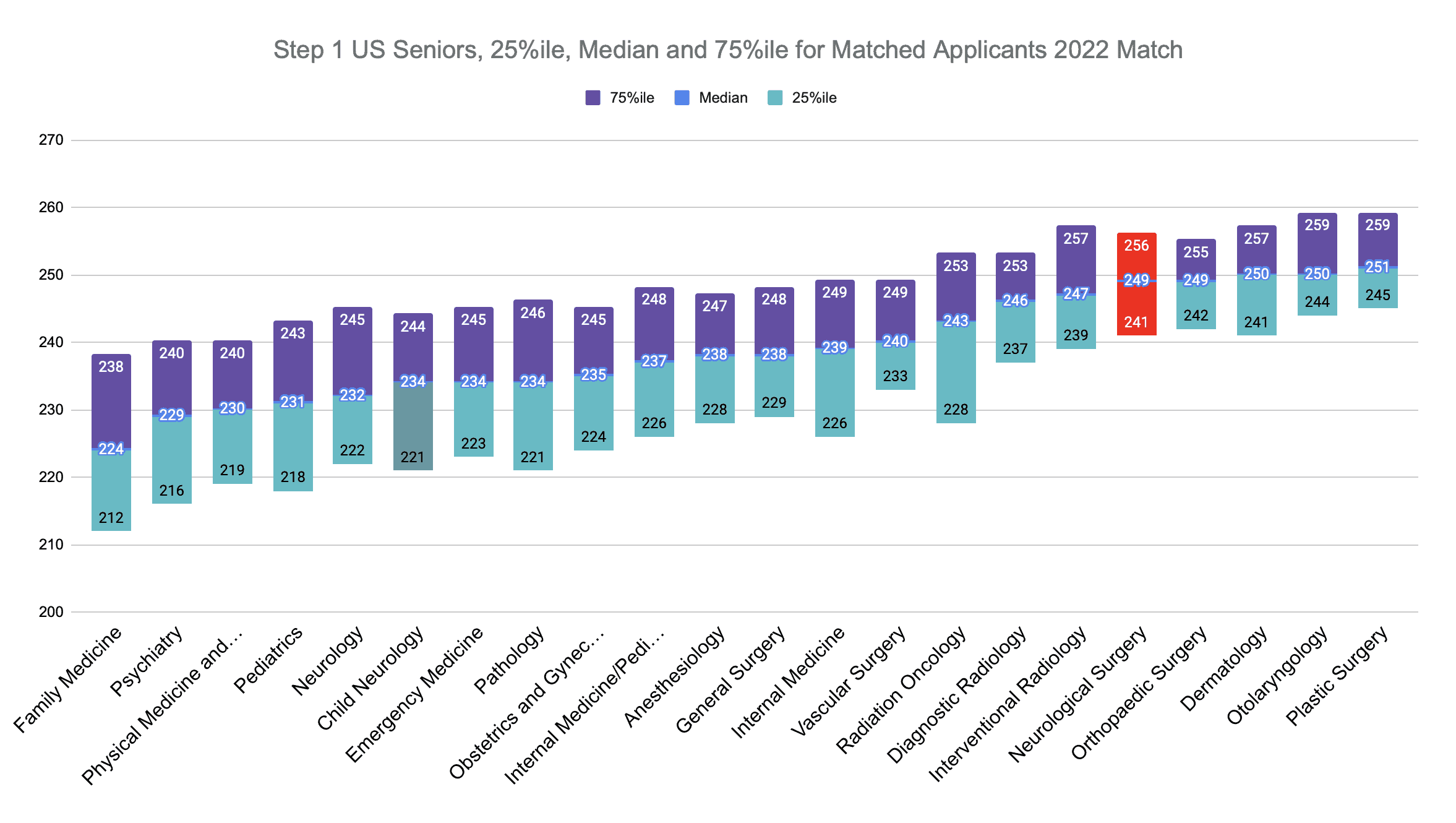
Step 1 Neurological Surgery Scores Are Middle of the Road (2022 Match)
Similarly, Step 2 CK scores for neurological surgery for matched US seniors reflect its moderate competitiveness.
Neurological Surgery Step 2 CK Scores (Matched Applicants in 2022 Match):
- 25%ile: 261
- Median: 254
- 75%ile: 246
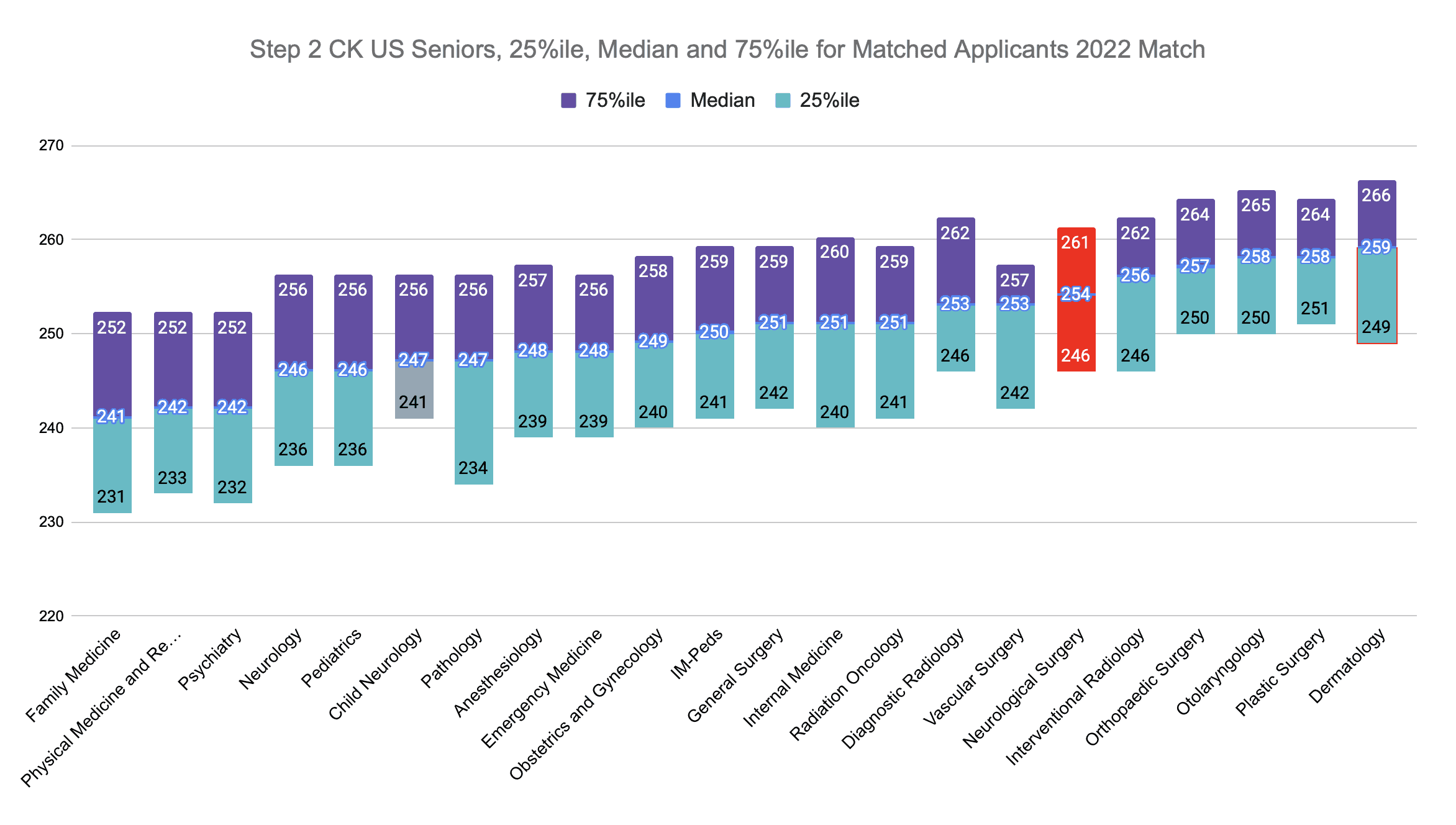
Step 2 CK Neurological Surgery Scores Are Middle of the Road (2022 Match)
See this article for more on USMLE Step 1 and Step 2 CK percentiles for each specialty and the overall percentiles.
Matching into Neurological Surgery as a DO
Matching into Neurological Surgery as a DO is moderately competitive, with a 43% match rate and 4% of spots filled by DO Seniors in the 2022 Match. In 2022, 21 DO seniors applied for Neurological Surgery; 9 matched.
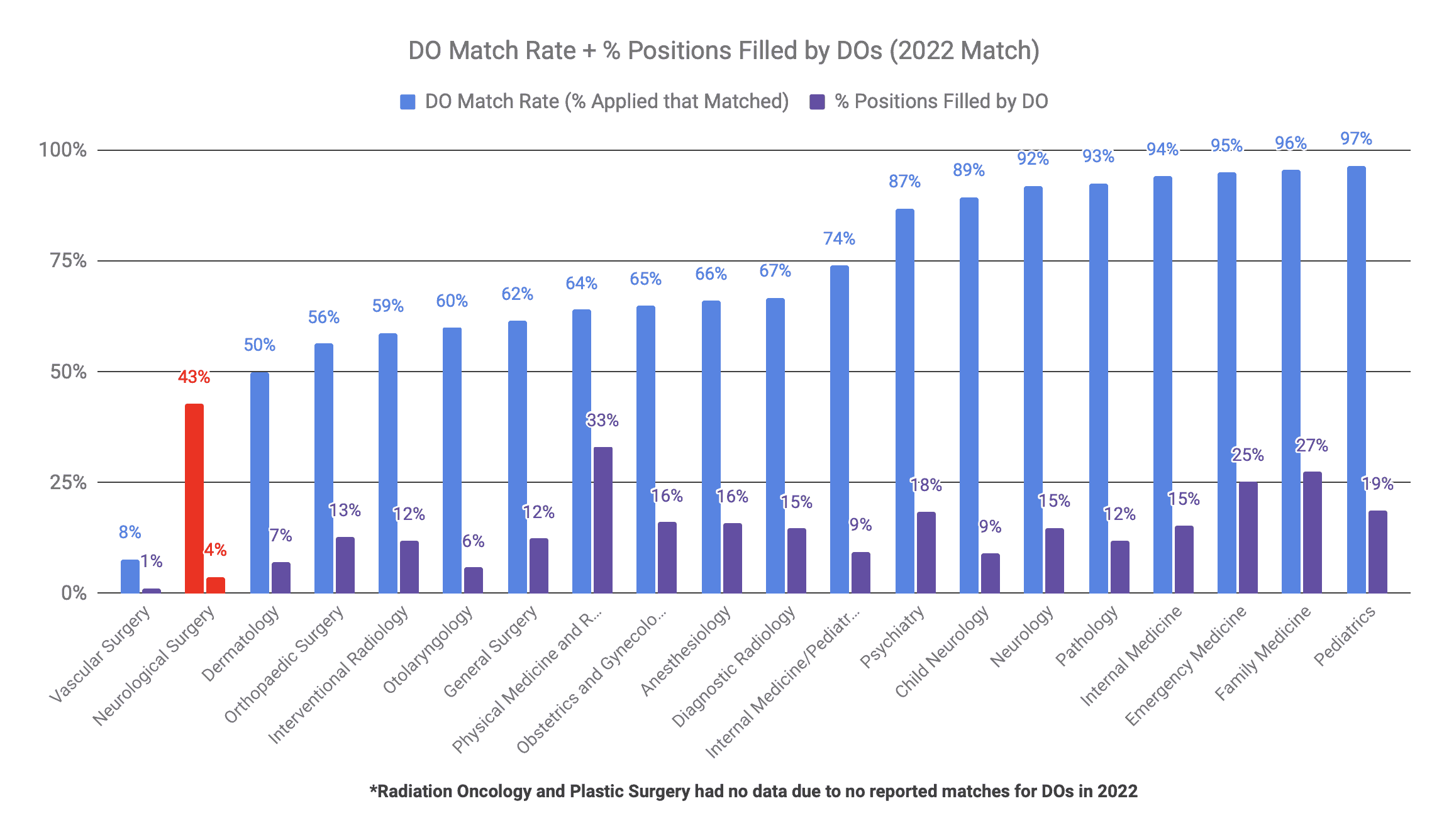
Neurological Surgery is Moderately DO-Friendly (2022 Match)
For more on the most DO-friendly specialties, see this article.
Is Neurological Surgery IMG Friendly?
Neurological Surgery is moderately IMG-friendly, with an overall 35% match rate and 8% of spots filled by IMGs in the 2022 Match. In 2022, 9 US IMGs and 42 non-US IMGs applied to Neurological Surgery; 2 US IMGs and 16 non-US IMGs matched.
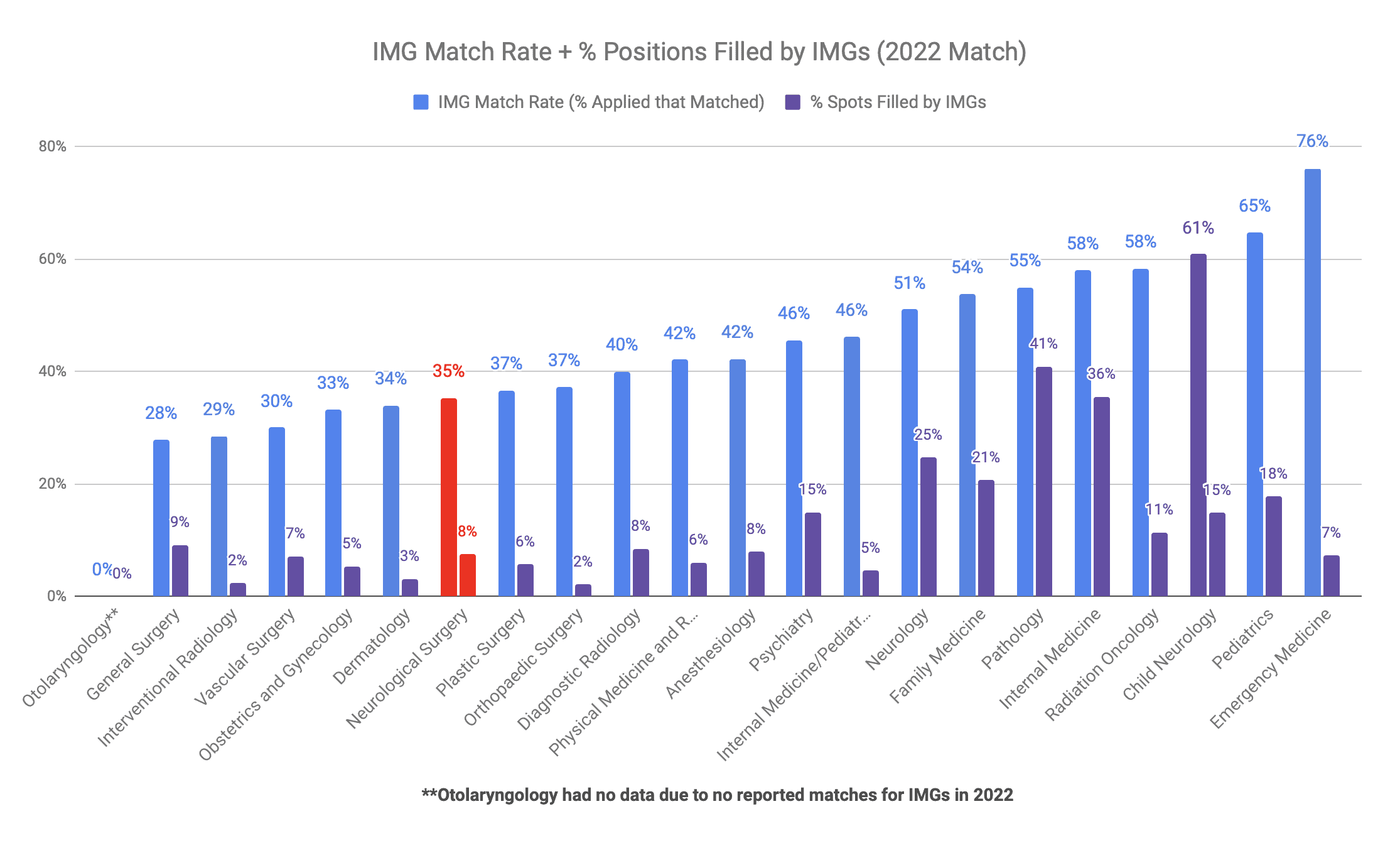
Neurological Surgery is Moderately IMG-Friendly (2022 Match)
We can see that US IMGs had a slightly lower match rate (22%) than non-US IMGs (38%) in Neurological Surgery.
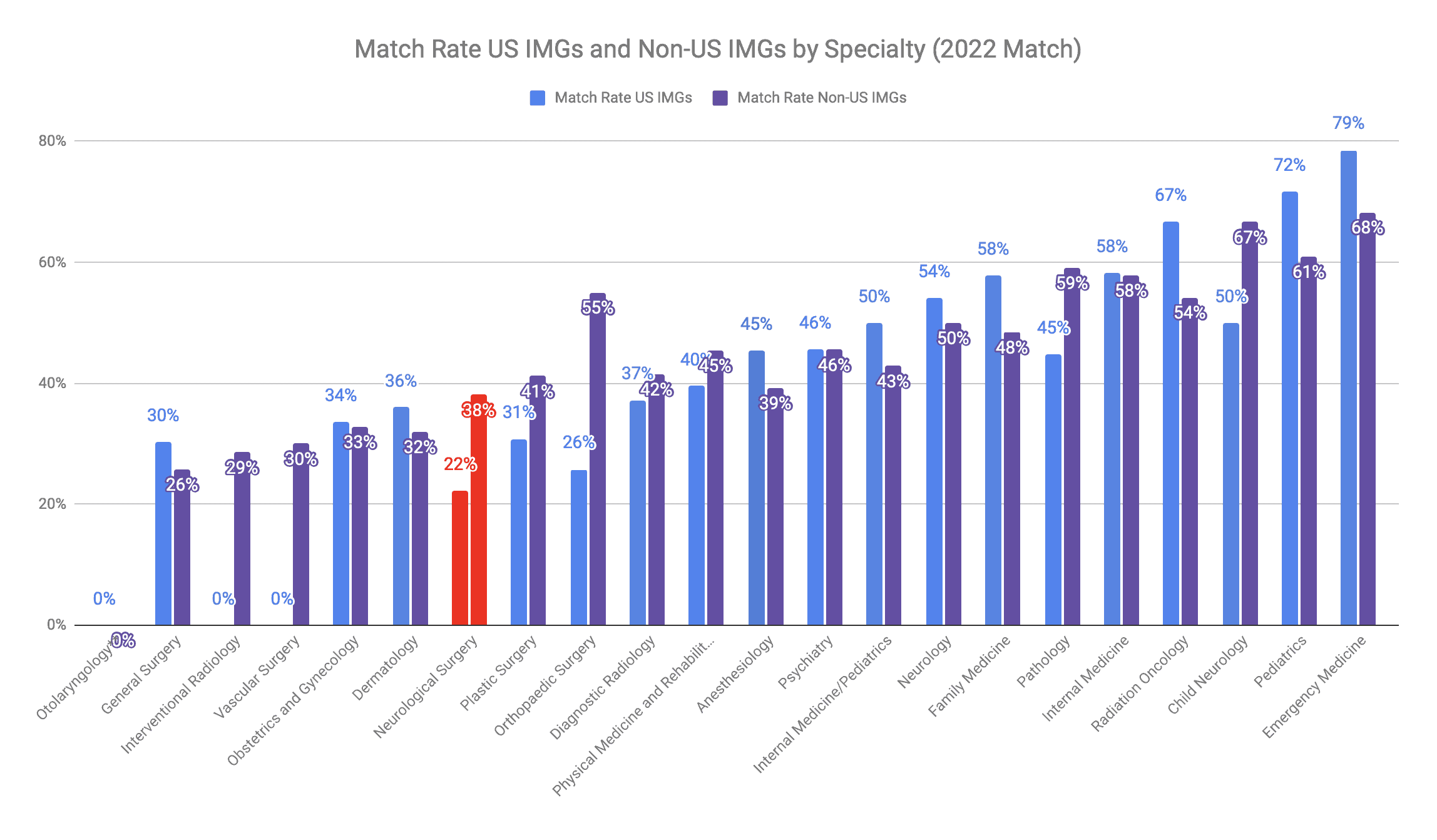
For Neurological Surgery, US IMGs had a slightly lower match rate (22%) than non-US IMGs (38%) in the 2022 Match
For more on the most IMG-friendly specialties, see this article.
Neurological Surgery-Friendly IMG Residency Programs
For a list of the most IMG-friendly neurological surgery programs, see this article.
How Much Do Neurological Surgeons Make per Year? Per Hour?
Neurological surgeons have an average annual salary of $601,000. This can vary dramatically based on practice setting, specialty training, and experience level.
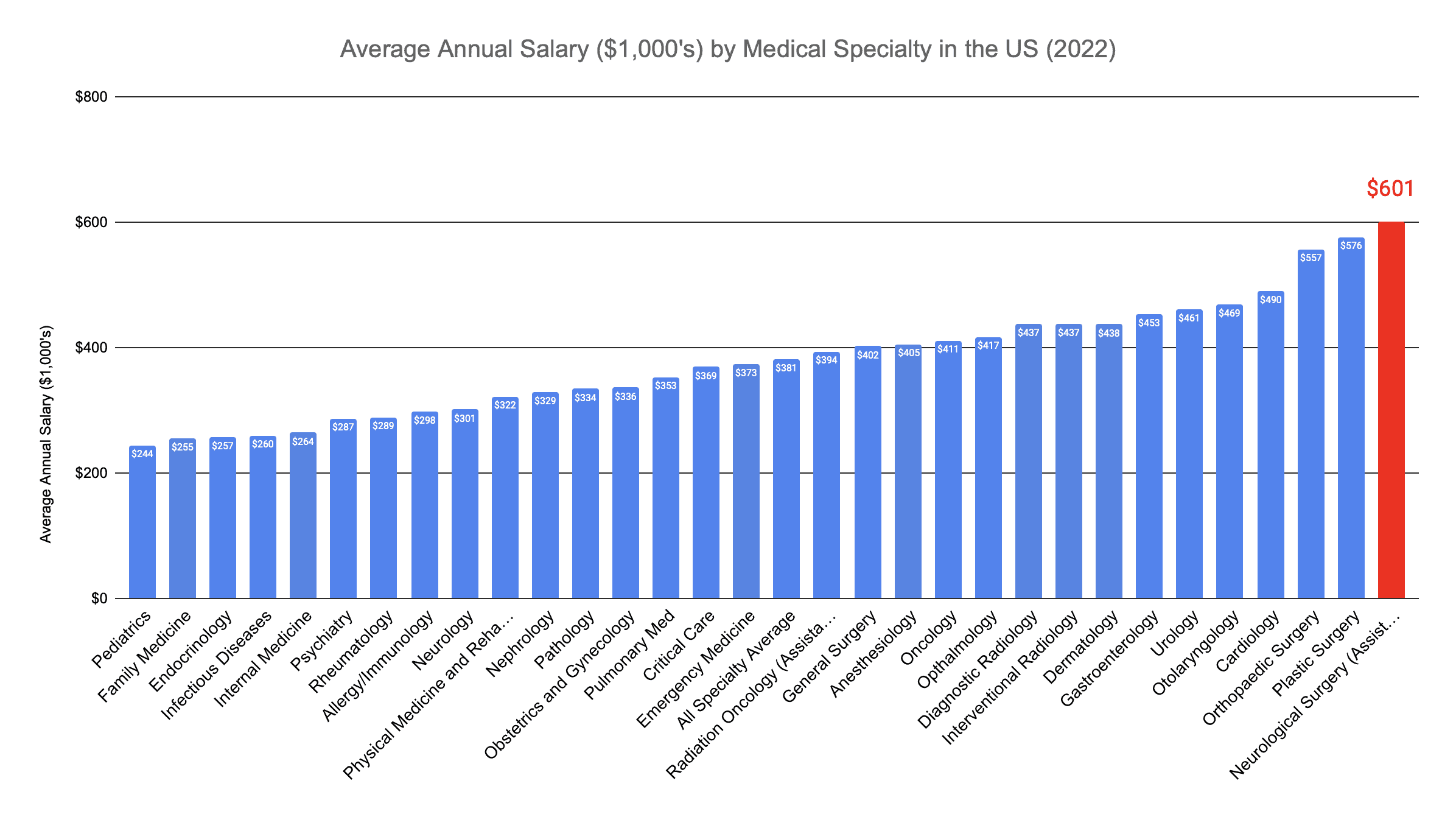
Neurological Surgeons make $601,000 per year on average
However, annual salaries can be misleading. Some specialties work much more than others. By considering the estimated hours worked per year for neurological surgeons, we get an estimated hourly salary of about $214/hr.
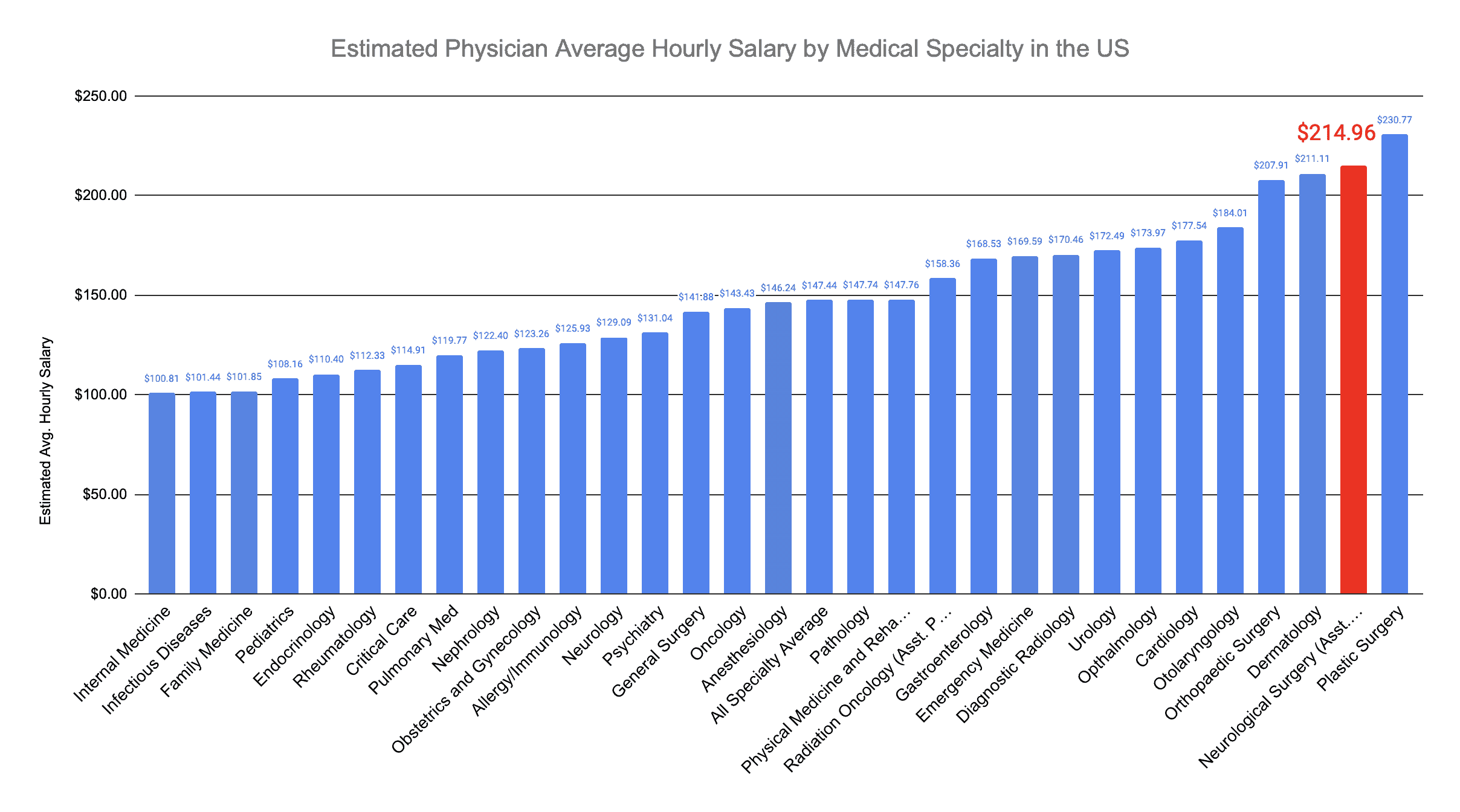
Neurological Surgeons make roughly $214/hr on average when taking in hours worked per year
See this article for more on physician annual salaries and estimated hourly wage by specialty.
How Important is AOA for Neurological Surgery?
AOA – Alpha Omega Alpha – is the med school honors society. Each school may elect up to 20% of the graduating class of students.
Having AOA membership confers a greater advantage to matching into some specialties more than others. Often this AOA advantage is greatest for the most competitive specialties.
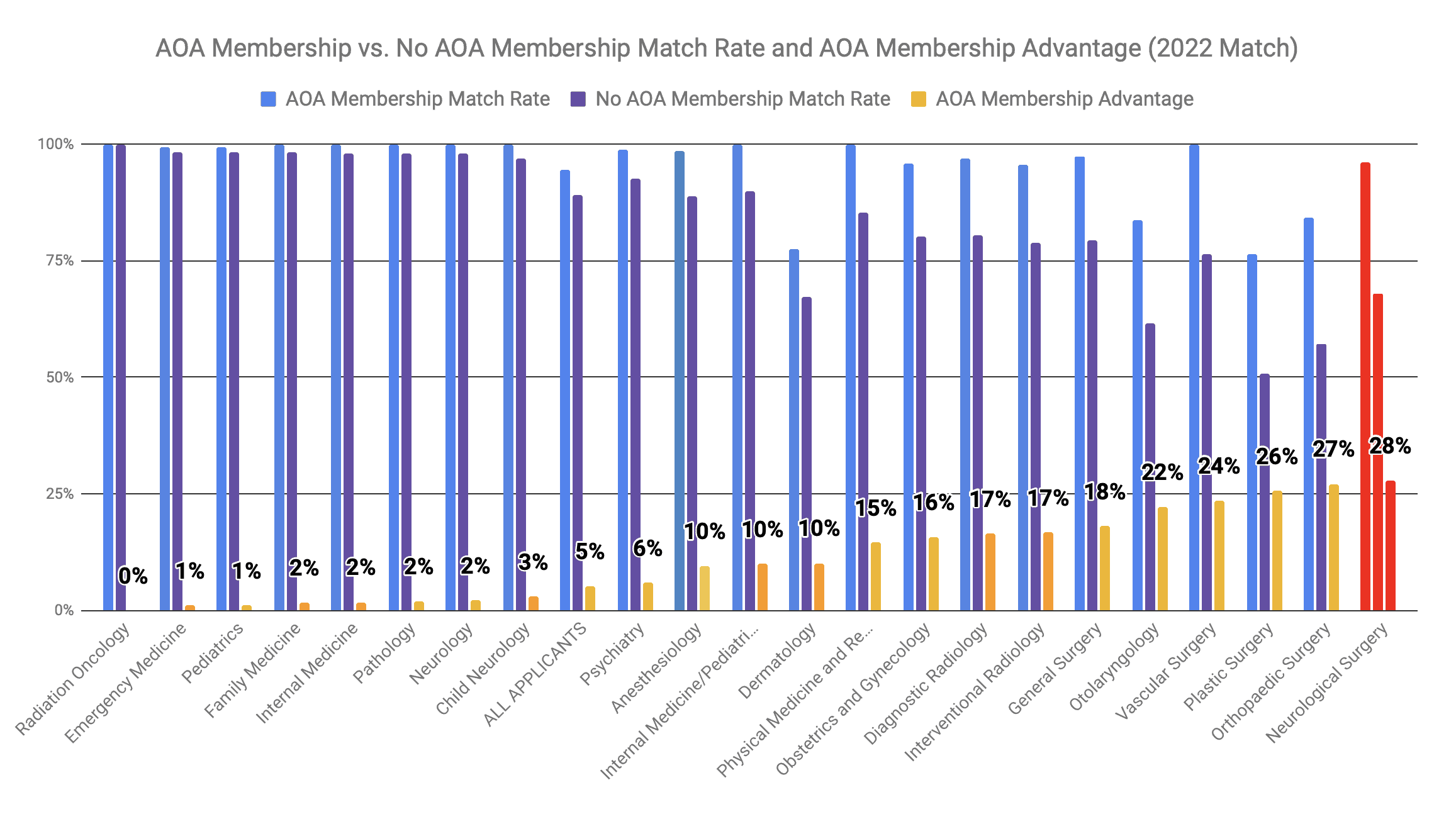
AOA membership correlated with a 28% match rate advantage for Neurological Surgery in the 2022 Match
In the 2022 Match, the match rate for US seniors with AOA membership was 28% greater than that of US seniors without AOA membership. AOA membership provided a large advantage to matching into neurological surgery residency.
A number of schools do not have AOA chapters. Even in those schools, many of them rank students against each other. Regardless of AOA status, we can see that class rank is an important factor in successfully matching into neurological surgery.
For more on AOA medical schools and the importance of class rank for matching, see this article.
How Many Publications for Neurological Surgery Residency in 2022
Research is an important characteristic for matching into many specialties, particularly the most competitive. So, how many publications do you need to match into a neurological surgery residency?
In 2022, the mean number of abstracts, presentations, and publications for US seniors who matched into anesthesiology was 25.5. The mean number of research experiences was 6.6.
Do I Need an MD-PhD to Match Into Neurological Surgery?
You may wonder how much an MD-PhD helps with matching into neurological surgery. It appears that having a PhD correlates with a slightly large advantage of 7% when applying into neurological surgery. Specifically, the match rate for those with a PhD is 7% higher than for those without one when applying into neurological surgery.
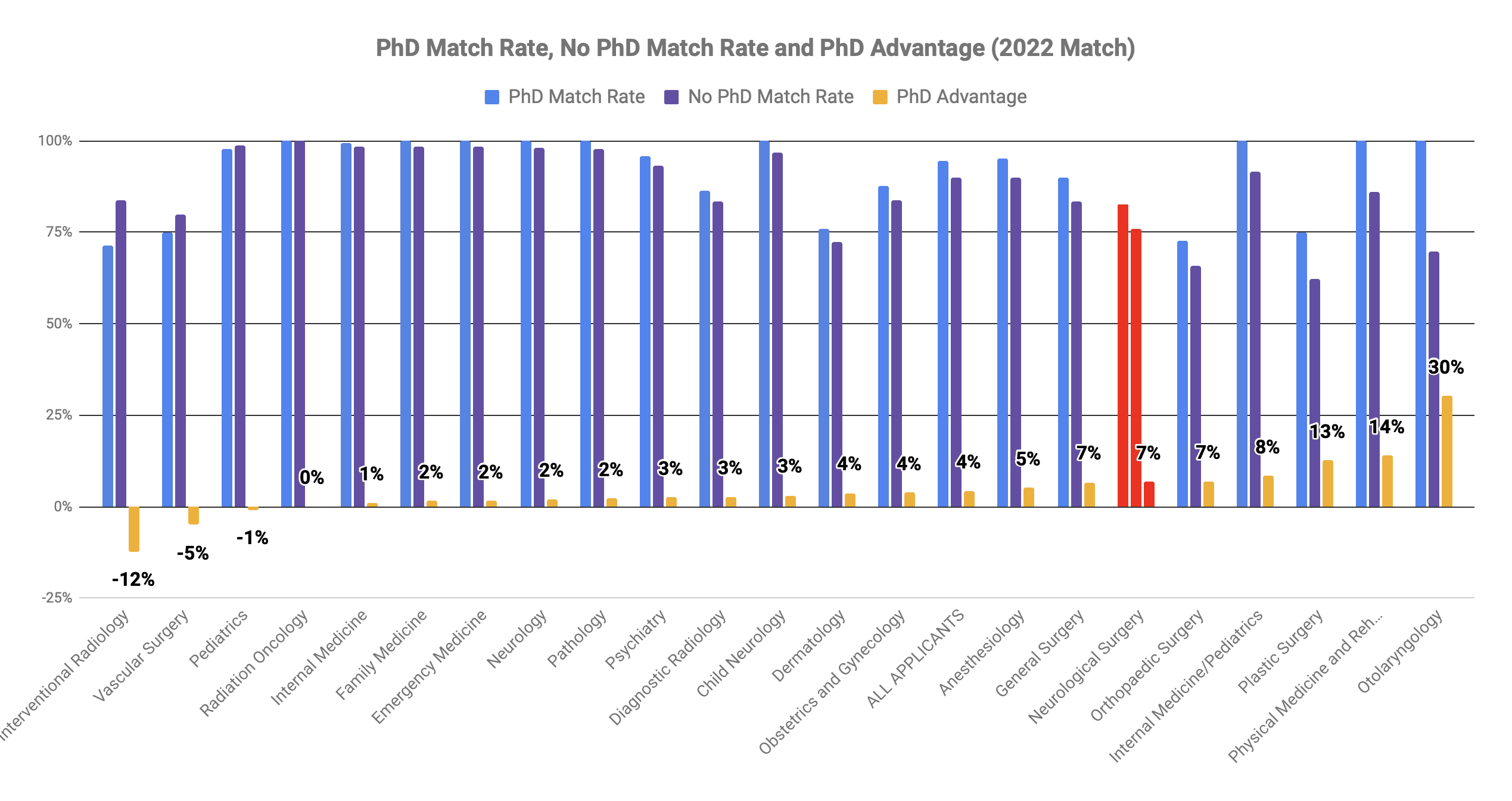
Having a PhD correlated with a 7% match rate advantage for Neurological Surgery in the 2022 Match
Note that those with PhDs are not completely uncommon among neurological surgery residents. In fact, 11.4% of matched applicants into neurological surgery had a PhD in 2022.
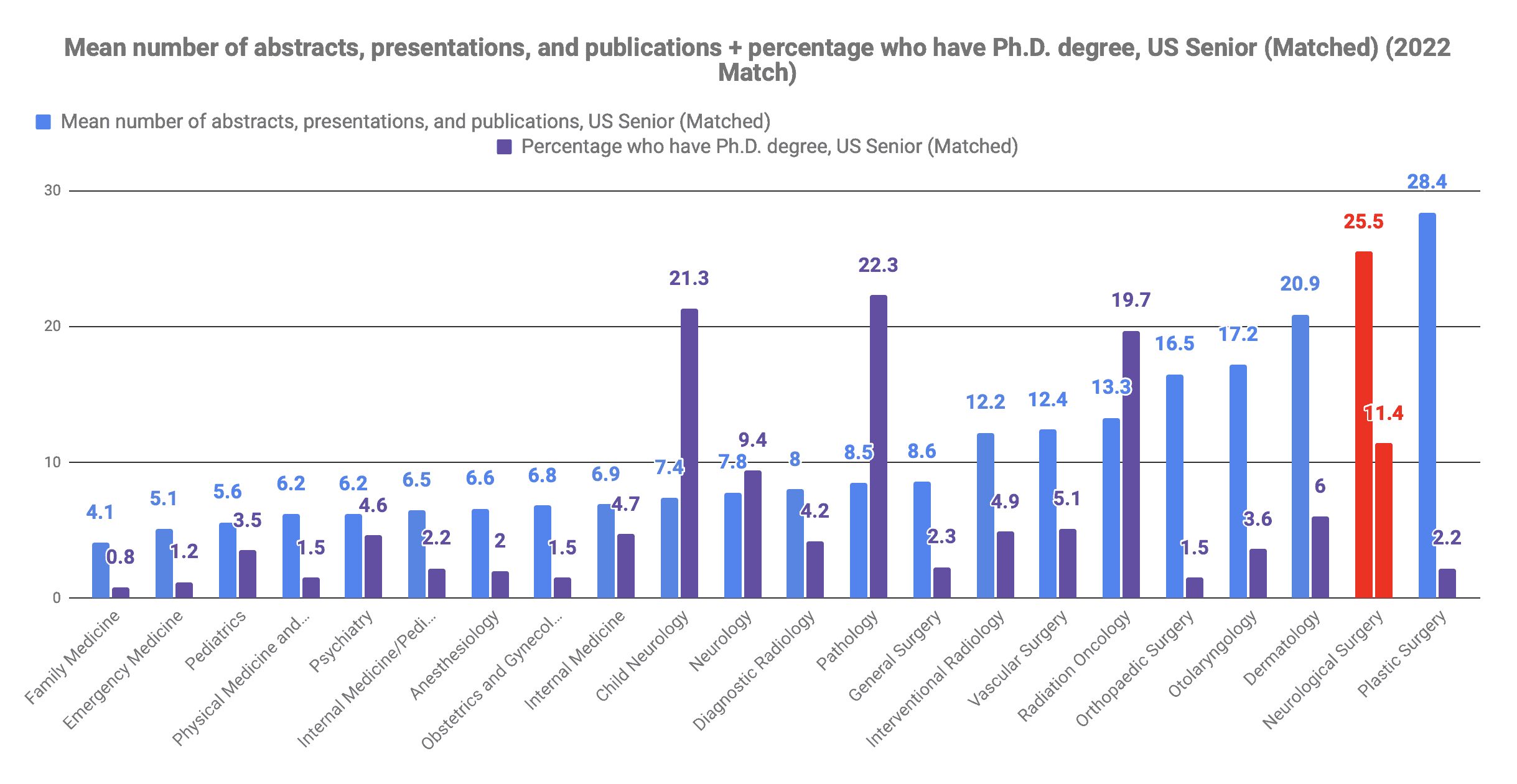
11.4% of matched applicants to Neurological Surgery had an MD-PhD in 2022
Should You Attend a Top Medical School to Match Into Neurological Surgery?
Does attending a top medical school help with matching into Neurological Surgery? According to the program director survey results above, 26.3% of Neurological Surgery PDs consider medical school reputation when considering whom to interview. The mean importance score was 4.
Similarly, we can look at the advantage of attending a school in the top 40 by NIH funding. In 2022, there was a 21% advantage in match rate to those attending a school in the top 40 for NIH funding vs. those who did not.
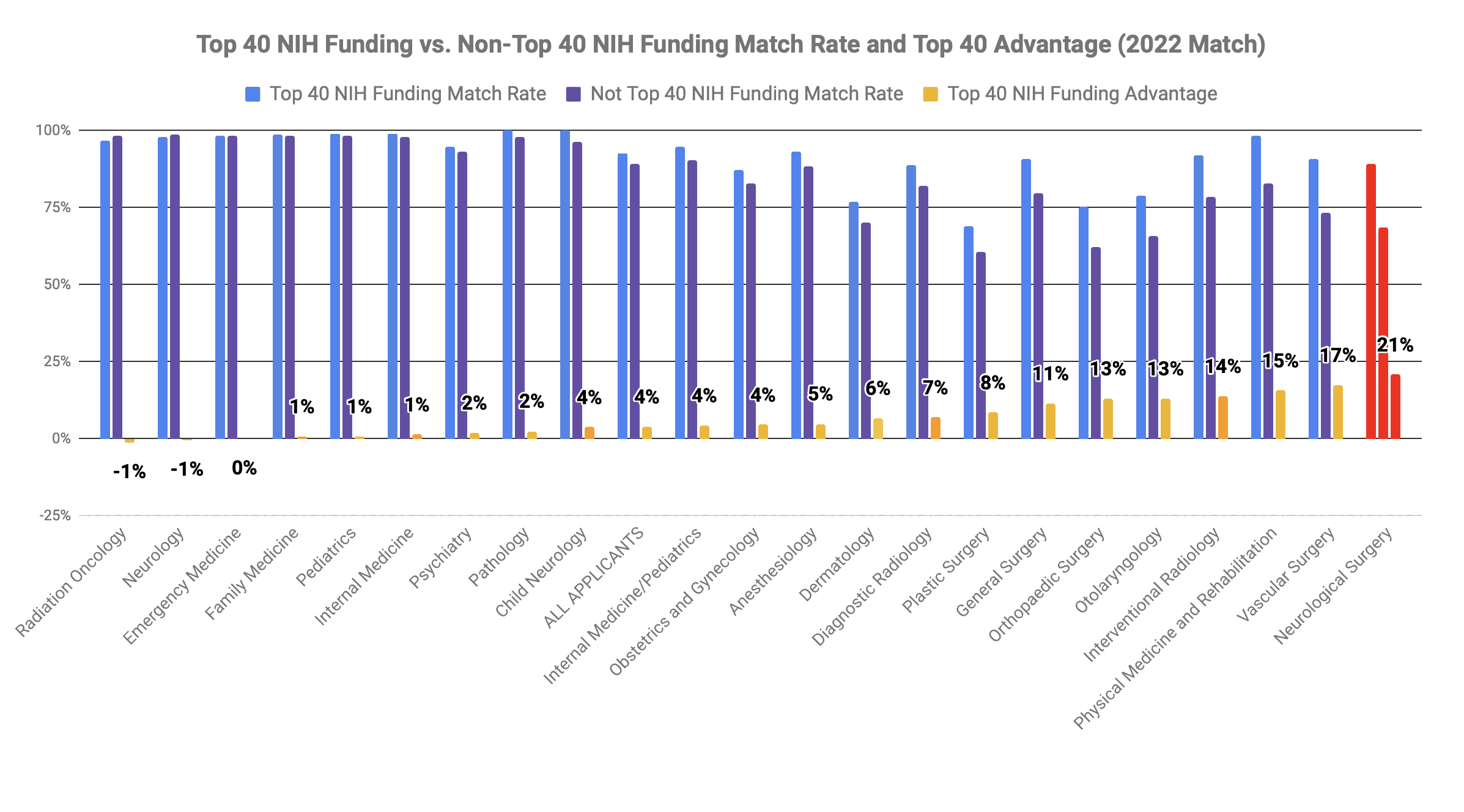
Graduating from a medical school ranked in the top 40 by NIH funding correlated with a 21% match rate advantage for Neurological Surgery in the 2022 Match
Does an MPH or MBA Help Match Into Neurological Surgery?
Medical training is long. Despite this, many consider – or complete – other degrees, like MPHs or MBAs.
But how much of an advantage – or disadvantage – does an MPH (Master of Public Health) or MBA (Master of Business Administration) confer when applying into neurological surgery? Not much, it turns out. In fact, the match rate for US seniors with other degrees was 1% lower than the rate for those with other degrees.
These statistics imply that having a second degree that isn’t a PhD doesn’t appear to help your chances of matching into neurological surgery, and may even hurt them (slightly).
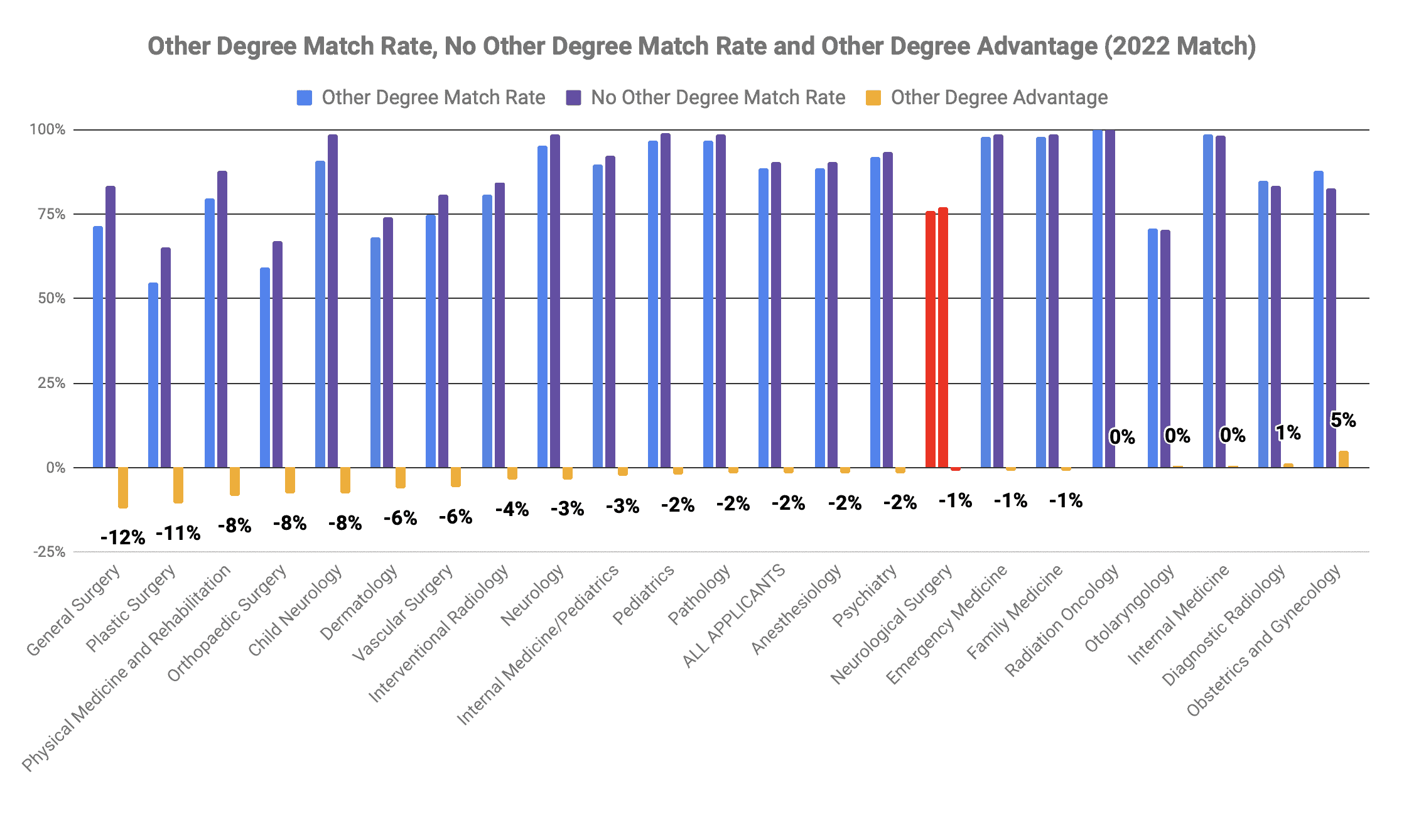
Having another degree like an MBA or MPH correlated with a -1% match rate disadvantage for Neurological Surgery in the 2022 Match
What Are the Best Neurological Surgery Programs?
While neurological surgery may be moderately competitive, the most desirable programs will always be extremely difficult to enter. So which are the best neurological surgery residency programs?
Opinions will vary. However, some of the most desirable neurological surgery residency programs would include:
- Massachusetts General Hospital
- University of California-San Francisco
- Brigham and Women’s Hospital
- Stanford Health Care
- Duke University Hospital
- Johns Hopkins University
Concluding Thoughts
So how competitive is neurological surgery in 2022? Based on the statistics, neurological surgery is highly competitive. It requires a huge amount of research and extra credentials such as AOA membership or an Ivy League education to match.
That said, if you want to match in neurological surgery, you can achieve it by working hard. While it is true for all specialties, USMLE scores – for both tests – will be emphasized moving forward, particularly given how reliant neurological surgery is on standardized screens to weed out applicants.
To learn more about how to master – not memorize – for impressive USMLE scores and higher class rankings, sign up for a free consultation. You can learn more about how Yousmle can help you to make the most of your time, to excel in your classes, Board exams, and the extracurriculars that are critical to matching.
Looking for a Neurological Surgery Residency Advisor?
Looking for a neurological surgery residency advisor? Want help writing your personal statement? Need effective strategies for interviewing? Do you have things on your application – e.g., low USMLE scores, failed USMLEs, no research, IMG status, or others – you need help overcoming?
Be sure to check out our Residency Advisor service.

